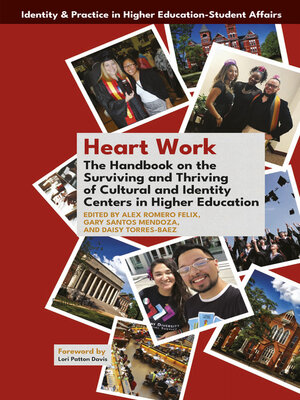Heart Work
ebook ∣ The Handbook on the Surviving and Thriving of Cultural and Identity Centers in Higher Education · Identity & Practice in Higher Education-Student Affairs
By Alex Romero Felix

Sign up to save your library
With an OverDrive account, you can save your favorite libraries for at-a-glance information about availability. Find out more about OverDrive accounts.
Find this title in Libby, the library reading app by OverDrive.



Search for a digital library with this title
Title found at these libraries:
| Library Name | Distance |
|---|---|
| Loading... |
Heart Work: The Handbook on the Survival and Success of Cultural and Identity Centers in Higher Education highlights the experiences of higher education professionals working in these centers. This handbook offers a blend of personal stories and the latest research on cultural and identity centers, building on Dr. Lori Patton Davis' 2010 book, Culture Centers in Higher Education: Perspectives on Identity, Theory, and Practice. Since 2010, these centers have navigated significant challenges, including the global COVID-19 pandemic, and have increased focus on institutional racism.
The book delves into the experiences and histories of various cultural and identity centers, including Latinx/e Cultural Centers, Asian, Pacific Islander, Middle Eastern Arab and Desi Cultural Centers, Native American/Indigenous Cultural Centers, Black/African American Cultural Centers, Disability Cultural Centers, Lesbian, Gay, Bisexual, Transgender, Queer+ Centers, and Undocumented Student Resource Centers. In light of recent events affecting minoritized populations, it also covers topics such as evolving practices in cultural/identity centers, university politics, and strategies for practitioners to advance and sustain the Heart Work.
Heart Work offers community members - especially potential and current practitioners, faculty, and staff in higher education - an understanding of the recent environmental context of cultural and identity centers. As our society evolves, recognizing that identities are not monolithic and embracing intersectionality allows for a deeper understanding of oppression and lived experiences. This handbook aims to bridge the gap by continuing the research and practice of cultural and identity centers in higher education.







